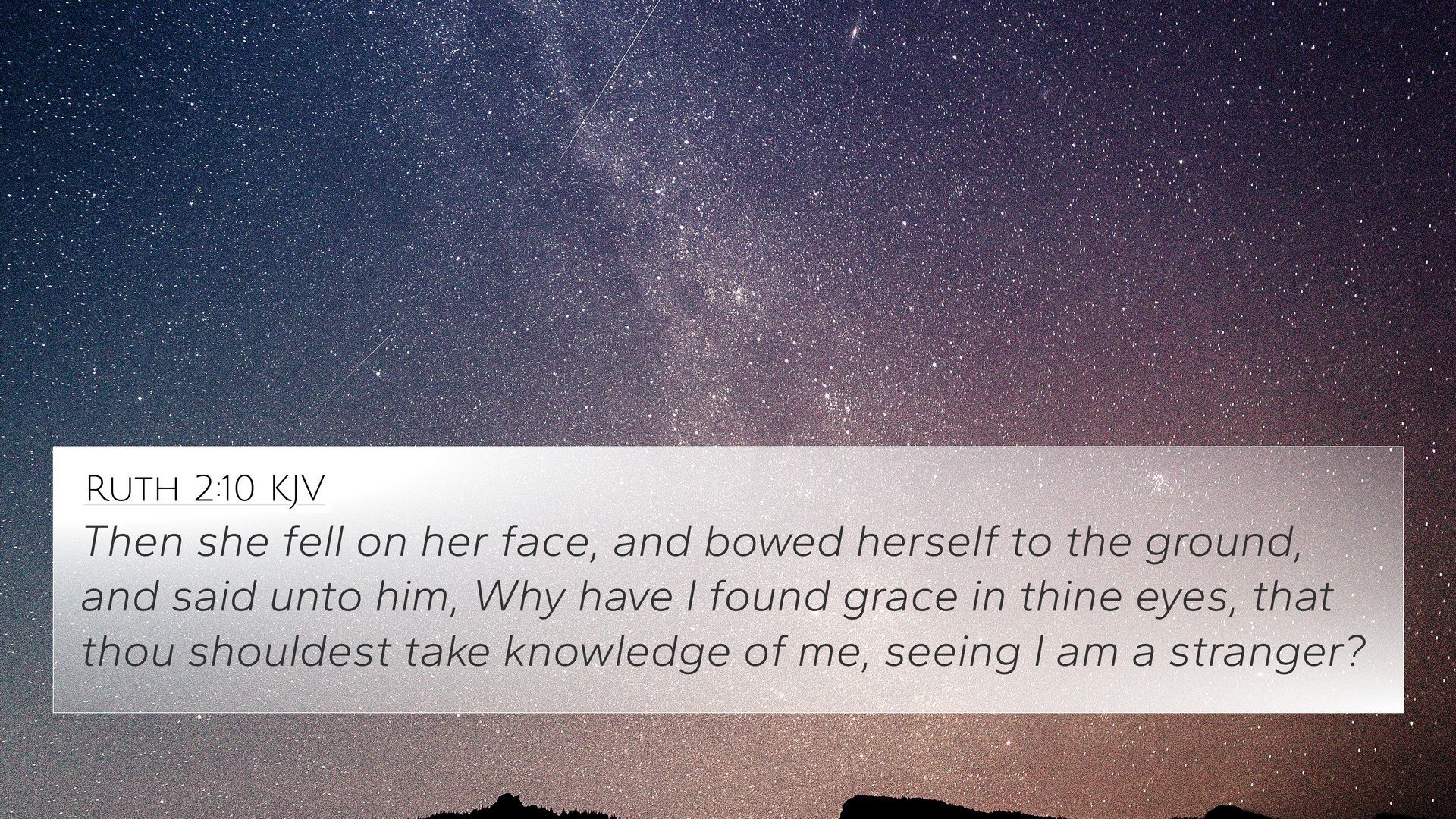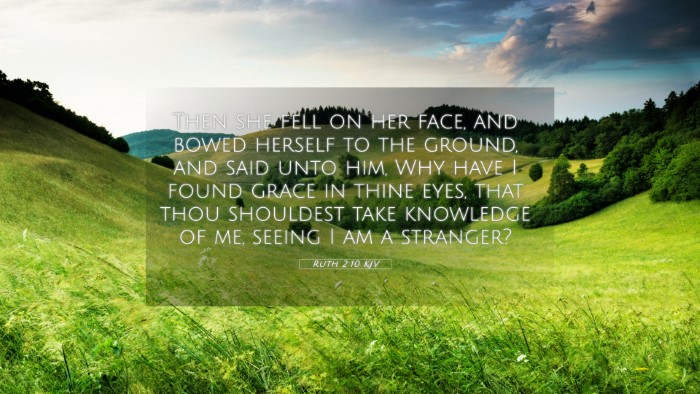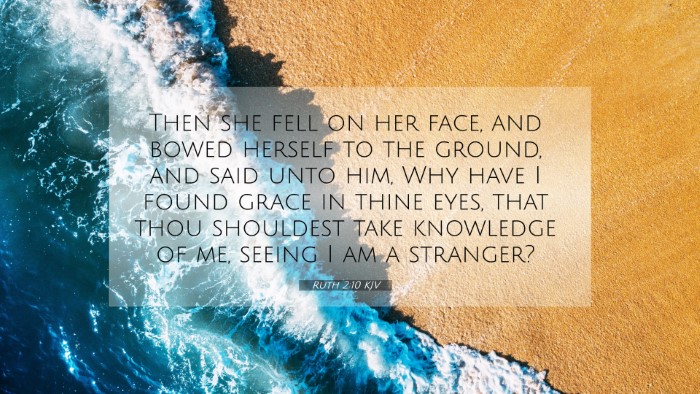Old Testament
Genesis Exodus Leviticus Numbers Deuteronomy Joshua Judges Ruth 1 Samuel 2 Samuel 1 Kings 2 Kings 1 Chronicles 2 Chronicles Ezra Nehemiah Esther Job Psalms Proverbs Ecclesiastes Song of Solomon Isaiah Jeremiah Lamentations Ezekiel Daniel Hosea Joel Amos Obadiah Jonah Micah Nahum Habakkuk Zephaniah Haggai Zechariah MalachiRuth 2:10 Similar Verses
Ruth 2:10 Cross References
Then she fell on her face, and bowed herself to the ground, and said unto him, Why have I found grace in thine eyes, that thou shouldest take knowledge of me, seeing I am a stranger?
Uncover the Rich Themes and Topics of This Bible Verse
Listed below are the Bible themes associated with Ruth 2:10. We invite you to explore each theme to gain deeper insights into the Scriptures.
Ruth 2:10 Cross Reference Verses
This section features a detailed cross-reference designed to enrich your understanding of the Scriptures. Below, you will find carefully selected verses that echo the themes and teachings related to Ruth 2:10 KJV. Click on any image to explore detailed analyses of related Bible verses and uncover deeper theological insights.
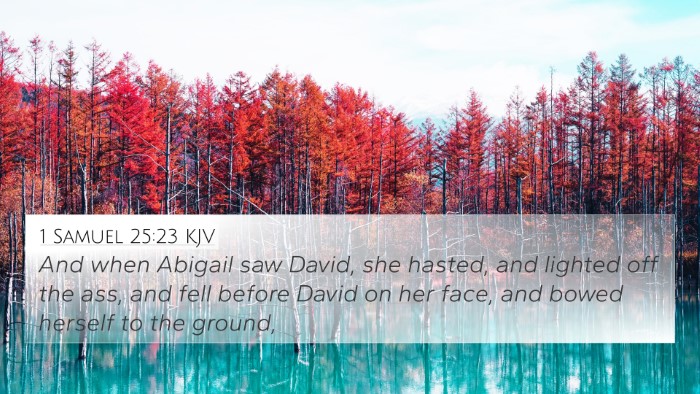
1 Samuel 25:23 (KJV) »
And when Abigail saw David, she hasted, and lighted off the ass, and fell before David on her face, and bowed herself to the ground,
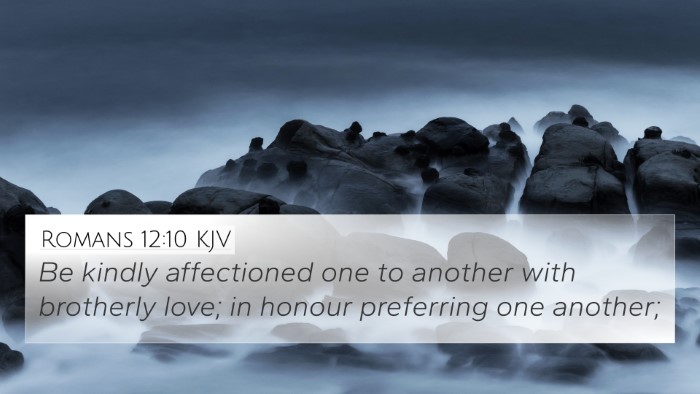
Romans 12:10 (KJV) »
Be kindly affectioned one to another with brotherly love; in honour preferring one another;
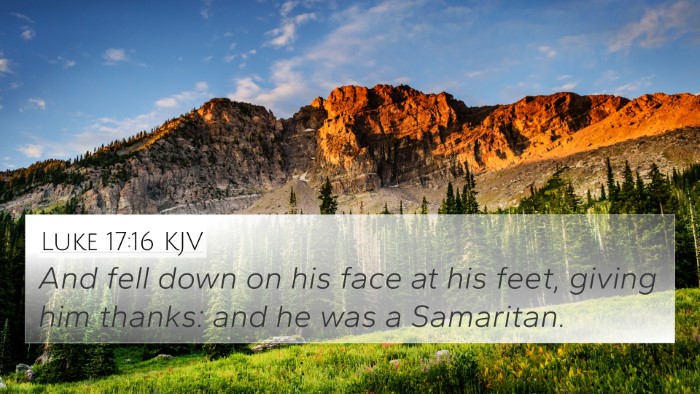
Luke 17:16 (KJV) »
And fell down on his face at his feet, giving him thanks: and he was a Samaritan.
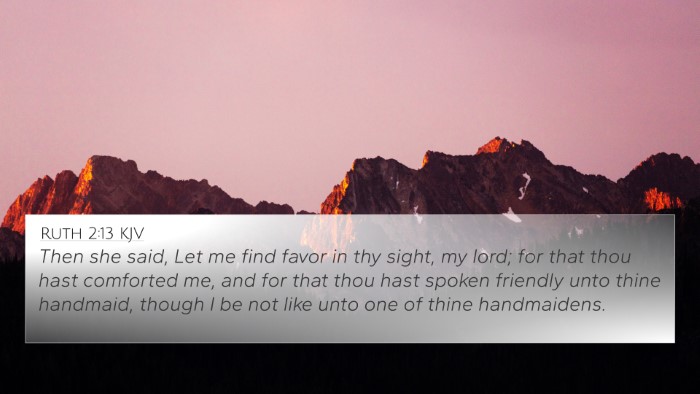
Ruth 2:13 (KJV) »
Then she said, Let me find favor in thy sight, my lord; for that thou hast comforted me, and for that thou hast spoken friendly unto thine handmaid, though I be not like unto one of thine handmaidens.
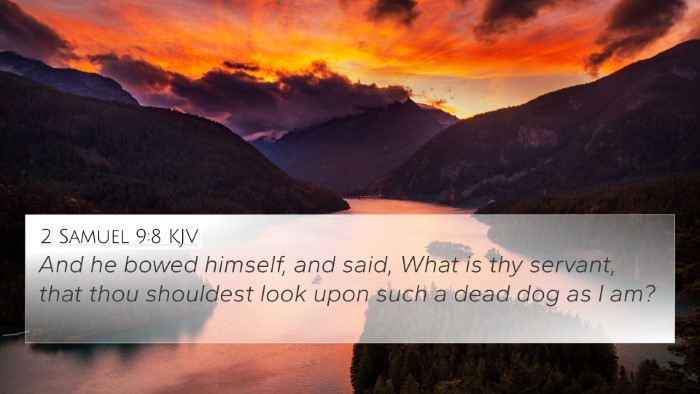
2 Samuel 9:8 (KJV) »
And he bowed himself, and said, What is thy servant, that thou shouldest look upon such a dead dog as I am?
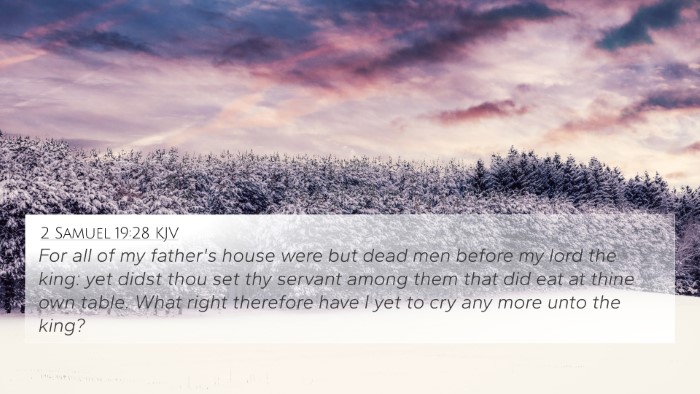
2 Samuel 19:28 (KJV) »
For all of my father's house were but dead men before my lord the king: yet didst thou set thy servant among them that did eat at thine own table. What right therefore have I yet to cry any more unto the king?
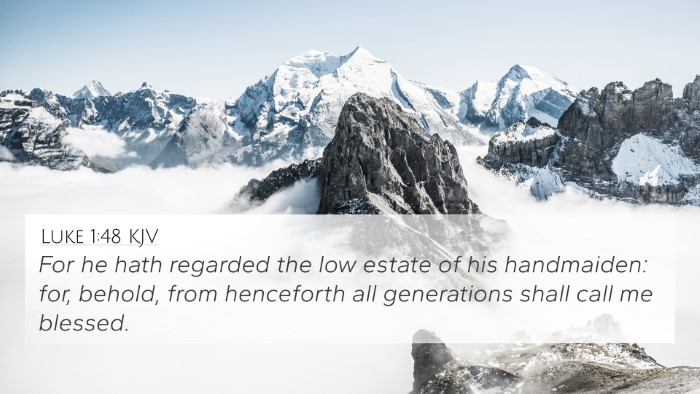
Luke 1:48 (KJV) »
For he hath regarded the low estate of his handmaiden: for, behold, from henceforth all generations shall call me blessed.
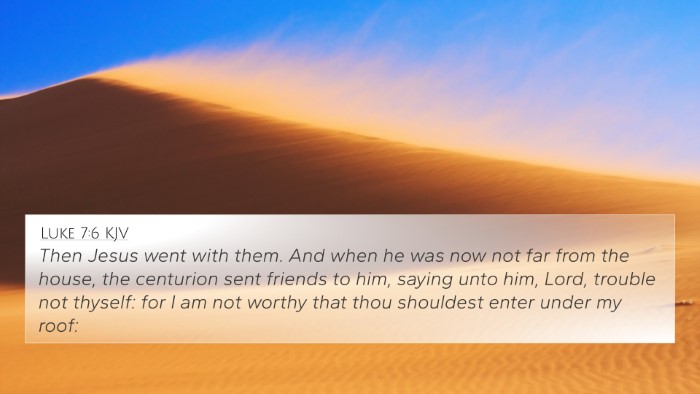
Luke 7:6 (KJV) »
Then Jesus went with them. And when he was now not far from the house, the centurion sent friends to him, saying unto him, Lord, trouble not thyself: for I am not worthy that thou shouldest enter under my roof:
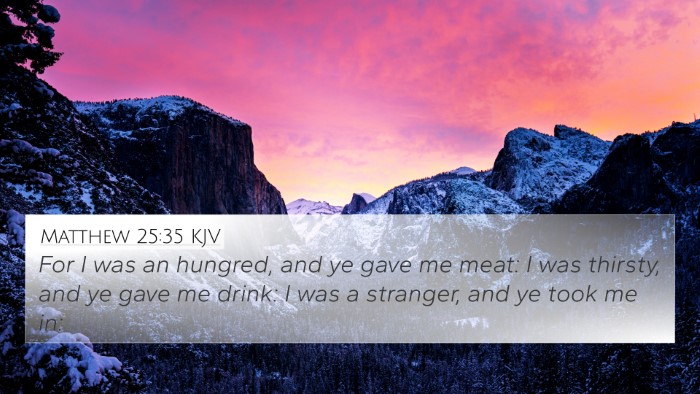
Matthew 25:35 (KJV) »
For I was an hungred, and ye gave me meat: I was thirsty, and ye gave me drink: I was a stranger, and ye took me in:
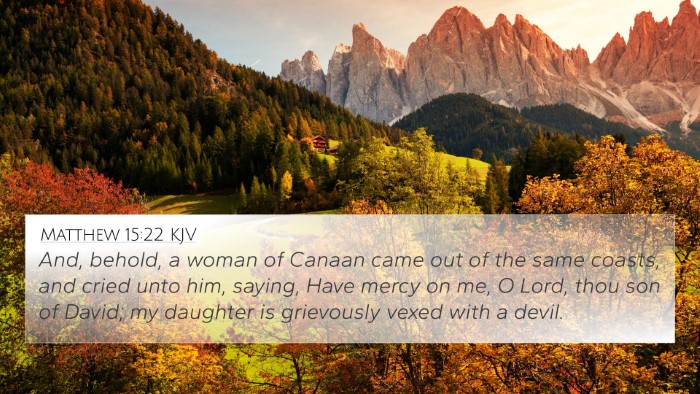
Matthew 15:22 (KJV) »
And, behold, a woman of Canaan came out of the same coasts, and cried unto him, saying, Have mercy on me, O Lord, thou son of David; my daughter is grievously vexed with a devil.
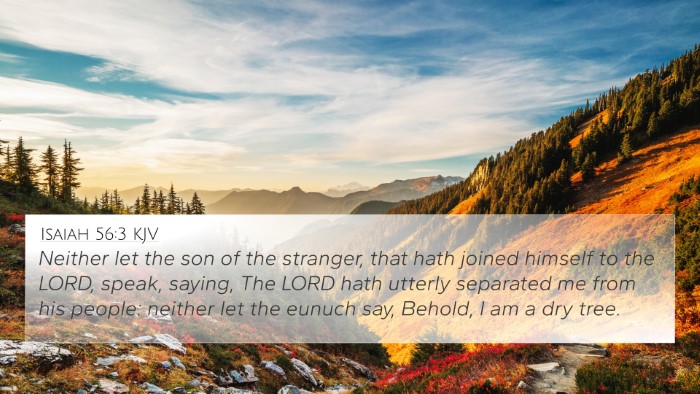
Isaiah 56:3 (KJV) »
Neither let the son of the stranger, that hath joined himself to the LORD, speak, saying, The LORD hath utterly separated me from his people: neither let the eunuch say, Behold, I am a dry tree.
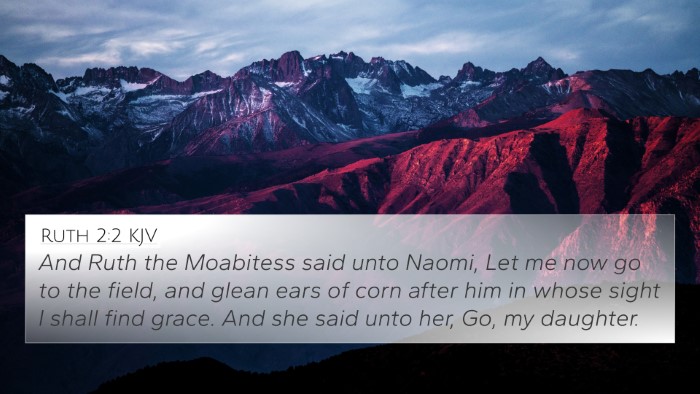
Ruth 2:2 (KJV) »
And Ruth the Moabitess said unto Naomi, Let me now go to the field, and glean ears of corn after him in whose sight I shall find grace. And she said unto her, Go, my daughter.
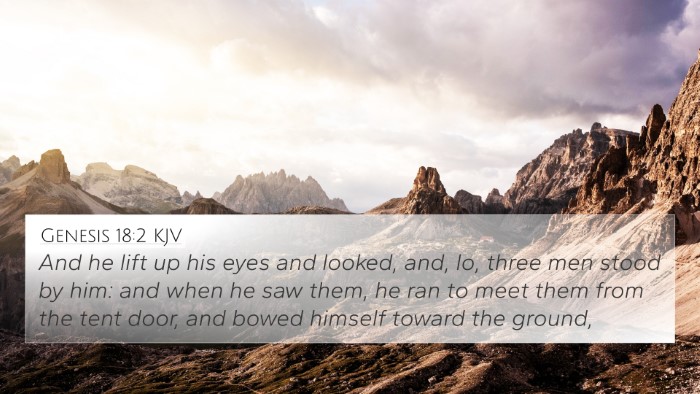
Genesis 18:2 (KJV) »
And he lift up his eyes and looked, and, lo, three men stood by him: and when he saw them, he ran to meet them from the tent door, and bowed himself toward the ground,
Ruth 2:10 Verse Analysis and Similar Verses
Interpretation of Ruth 2:10
Bible Verse: Ruth 2:10 - "Then she fell on her face, bowing to the ground and said to him, 'Why have I found favor in your sight, that you should take notice of me, since I am a foreigner?'
This verse captures a poignant moment in the Book of Ruth, highlighting themes of grace, humility, and divine providence. Ruth, a Moabite widow, demonstrates her humility as she expresses her astonishment at receiving favor from Boaz, a wealthy Israelite landowner. Public domain commentaries shed light on several key aspects of this verse.
Summary of Commentary Insights
-
Matthew Henry:
Henry emphasizes Ruth's humble response and appreciation for Boaz's kindness. He points out that her status as a foreigner magnifies the grace extended to her. The act of bowing symbolizes reverence and recognized her unworthiness, a theme echoed throughout Scripture where the humble are exalted (see James 4:10).
-
Albert Barnes:
Barnes discusses the significance of Ruth's question to Boaz—why he would take notice of her. He suggests that this highlights the contrast between her status as a Moabite and the favor of God, demonstrating a broader theme of inclusion within God's family, as also shown in Isaiah 56:6-7, where God welcomes the foreigner.
-
Adam Clarke:
Clarke elaborates on the cultural context, noting that Ruth's humble request for favor reflects the societal norms of the time. His commentary connects Ruth's experience to the larger narrative of redemption found in the Bible, linking her to Christ as a symbol of hope and inclusion for all believers, as seen in Acts 10:34-35.
Key Themes and Connections
The verse not only illustrates Ruth's character but also unveils the grand themes of God's grace reaching beyond ethnic and cultural boundaries.
- Humility and Reverence: Ruth's act of bowing reflects deep humility, encouraging believers to approach God with a similar spirit (Proverbs 22:4).
- God's Favor: The surprise at receiving favor can lead us to reflect on the nature of God's grace in our own lives (Ephesians 2:8-9).
- Redemption: Ruth's story foreshadows the redemptive work of Christ, emphasizing God's plan to include Gentiles among His people (Galatians 3:28).
Cross References for Ruth 2:10
The following verses provide thematic and contextual connections to Ruth 2:10:
- James 4:10: "Humble yourselves before the Lord, and he will lift you up."
- Isaiah 56:6-7: "And the foreigners who bind themselves to the Lord to minister to him... I will bring to my holy mountain and give them joy in my house of prayer."
- Acts 10:34-35: "Then Peter began to speak: 'I now realize how true it is that God does not show favoritism but accepts from every nation the one who fears him and does what is right.'
- Ephesians 2:8-9: "For it is by grace you have been saved, through faith—and this is not from yourselves, it is the gift of God."
- Galatians 3:28: "There is neither Jew nor Gentile, neither slave nor free, nor is there male and female, for you are all one in Christ Jesus."
- Proverbs 22:4: "Humility is the fear of the Lord; its wages are riches and honor and life."
- Luke 18:14: "For all those who exalt themselves will be humbled, and those who humble themselves will be exalted."
Exploring the Spiritual Significance
This verse invites believers to consider their own humility in the face of divine grace. Like Ruth, we may often wonder why God chooses to notice and accept us into His family, especially in light of our shortcomings and past lives. Here are some reflections based on the insights from the commentaries:
-
God's Grace Abounds:
The principle that God's grace is not limited to those we perceive as deserving is a recurring theme in Scripture. Ruth's experience embodies the grace that transcends cultural and personal barriers.
-
Divine Inclusion:
Ruth’s foreignness represents those on the margins of society. Her story exemplifies how God includes everyone in His redemptive plan, echoing in the New Testament through the ministry of Christ.
-
Response to Grace:
Our response to God's favor should be one of humility and gratitude, recognizing the unmerited nature of the grace we receive.
Conclusion
Ruth 2:10 serves as a powerful reminder of God's inclusive love and the humility that ought to characterize our interactions with Him and each other. Through the eyes of various commentaries, we see how this verse connects with the larger biblical narrative, transforming how we understand God's grace and our place in His divine plan.
Related Themes and Concepts
Studying this verse helps us unlock various thematic connections throughout the Scriptures:
- The nature of humility as a pathway to experiencing God's blessings.
- The role of Gentiles in God’s plan of salvation.
- The concept of divine favor and its implications for our spiritual lives.
Engaging with Scripture: Cross-Referencing Tools
For those interested in further exploring the connections between Bible verses, numerous tools can assist:
- Bible concordances for thematic searches.
- Cross-reference Bible guides to trace related passages.
- Comprehensive Bible cross-reference materials for in-depth study.
By utilizing these resources, believers can deepen their understanding of how Scripture interconnects, enhancing their spiritual journey and biblical literacy.
